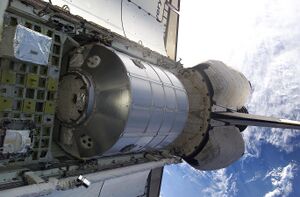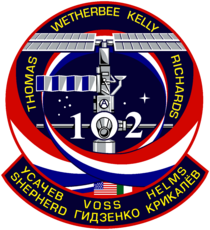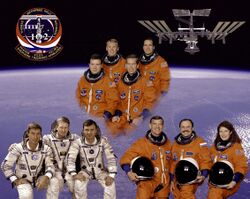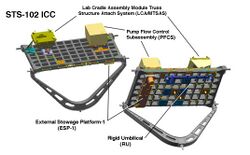Engineering:STS-102
 ICC (left) and the MPLM Leonardo (center) in Discovery's payload bay | |
| Names | Space Transportation System-102 |
|---|---|
| Mission type | ISS crew rotation |
| Operator | NASA |
| COSPAR ID | 2001-010A |
| SATCAT no. | 26718 |
| Mission duration | 12 days, 19 hours, 51 minutes, 57 seconds |
| Distance travelled | 8.5 million kilometres (5.3 million miles) |
| Spacecraft properties | |
| Spacecraft | Space Shuttle Discovery |
| Launch mass | 99,503 kilograms (219,367 lb) |
| Landing mass | 90,043 kilograms (198,511 lb) |
| Payload mass | 5,760 kilograms (12,700 lb) |
| Crew | |
| Crew size | 7 |
| Members |
|
| Launching |
|
| Landing |
|
| EVAs | 2 |
| EVA duration | 15 hours, 17 minutes |
| Start of mission | |
| Launch date | 8 March 2001, 11:42 UTC |
| Launch site | Kennedy LC-39B |
| End of mission | |
| Landing date | 21 March 2001, 07:33:06 UTC |
| Landing site | Kennedy SLF Runway 15 |
| Orbital parameters | |
| Reference system | Geocentric |
| Regime | Low Earth |
| Perigee altitude | 370 kilometres (230 mi) |
| Apogee altitude | 381 kilometres (237 mi) |
| Inclination | 51.5 degrees |
| Period | 92.1 minutes |
| Docking with ISS | |
| Docking port | PMA-2 (Destiny forward) |
| Docking date | 10 March 2001, 06:38 UTC |
| Undocking date | 19 March 2001, 04:32 UTC |
| Time docked | 8 days, 21 hours, 54 minutes |

 The STS-102 crew portrait. | |
STS-102 was a Space Shuttle mission to the International Space Station (ISS) flown by Space Shuttle Discovery and launched from Kennedy Space Center, Florida. STS-102 flew in March 2001; its primary objectives were resupplying the ISS and rotating the Expedition 1 and Expedition 2 crews. At eight hours 56 minutes, the first EVA performed on the mission remains the longest spacewalk ever undertaken.
Crew
| Position | Launching Astronaut | Landing Astronaut |
|---|---|---|
| Commander | Fifth spaceflight | |
| Pilot | First spaceflight | |
| Mission Specialist 1 | Third spaceflight | |
| Mission Specialist 2 | Only spaceflight | |
| Mission Specialist 3 | Expedition 2 Fourth and last spaceflight ISS Commander/ISS Soyuz Commander |
Expedition 1 Fourth and last spaceflight ISS Commander |
| Mission Specialist 4 | Expedition 2 Fifth and last spaceflight ISS Flight Engineer |
Expedition 1 Second spaceflight ISS Soyuz Commander [1] |
| Mission Specialist 5 | Expedition 2 Fifth and last spaceflight ISS Flight Engineer 2[2] |
Expedition 1 Fifth spaceflight ISS Flight Engineer |
Spacewalks
- Voss and Helms – EVA 1
- EVA 1 Start: 11 March 2001 – 05:12 UTC
- EVA 1 End: 11 March 2001 – 14:08 UTC
- Duration: 8 hours, 56 minutes
- Thomas and Richards – EVA 2
- EVA 2 Start:13 March 2001 – 05:23 UTC
- EVA 2 End: 13 March 2001 – 11:44 UTC
- Duration: 6 hours, 21 minutes
Mission highlights
Space Station Assembly Flight ISS-5A.1 was the first use of the Multi Purpose Logistics Module (Leonardo) to bring supplies to the station. The steel modules were equipped with up to 16 International Standard Payload Racks for installation in the US Lab. Also carried an Integrated Cargo Carrier (ICC). The ICC had the External Stowage Platform-1 mounted on its underside. ESP-1 was placed on the port side of 'Destiny' as a storage location for ORUs. The mission also included two spacewalks to relocate the units carried up by the ICC to the Destiny module exterior.
Wake-up calls
NASA began a tradition of playing music to astronauts during the Gemini program, which was first used to wake up a flight crew during Apollo 15.[3] Each track is specially chosen, often by their families, and usually has a special meaning to an individual member of the crew, or is applicable to their daily activities.[3][4]
| Flight Day | Song | Artist/Composer |
|---|---|---|
| Day 2 | "Living the Life" | Rockit Scientists |
| Day 4 | "Nothing's Gonna Stop Us Now" | Starship |
| Day 6 | "From A Distance" | Nancy Griffith |
| Day 7 | "Free Fallin'" | Tom Petty & the Heartbreakers |
| Day 8 | "Should I Stay or Should I Go" | The Clash |
| Day 12 | "Moscow Windows" | Unknown |
See also
- List of human spaceflights
- List of International Space Station spacewalks
- List of Space Shuttle missions
- List of spacewalks and moonwalks 1965–1999
- Outline of space science
References
![]() This article incorporates public domain material from websites or documents of the National Aeronautics and Space Administration.
This article incorporates public domain material from websites or documents of the National Aeronautics and Space Administration.
- ↑ "Expedition 1 Press Kit". NASA. p. 6. https://spaceflight.nasa.gov/station/crew/exp1/exp1_presskit.pdf. "From left, they are Flight Engineer and Russian Cosmonaut Sergei Krikalev; International Space Station Commander and U.S. Astronaut Bill Shepherd; and Soyuz Commander and Russian Cosmonaut Yuri Gidzenko."
- ↑ "Expedition 2 Press Kit". NASA. 6 March 2001. https://spaceflight.nasa.gov/station/crew/exp2/exp2_presskit.pdf. ""During her four-month stay on the ISS, Helms will serve as Flight Engineer-2.""
- ↑ 3.0 3.1 Fries, Colin (25 June 2007). "Chronology of Wakeup Calls". NASA. https://history.nasa.gov/wakeup%20calls.pdf.
- ↑ NASA (11 May 2009). "STS-102 Wakeup Calls". NASA. http://spaceflight.nasa.gov/gallery/audio/shuttle/sts-102/html/ndxpage1.html.
External links
 |



